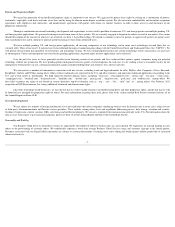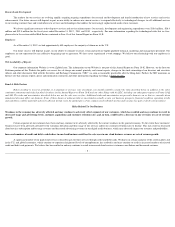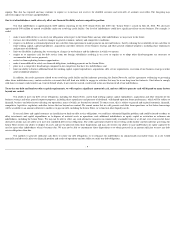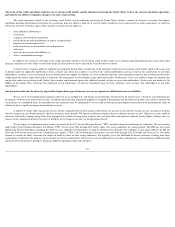eFax 2012 Annual Report Download - page 18
Download and view the complete annual report
Please find page 18 of the 2012 eFax annual report below. You can navigate through the pages in the report by either clicking on the pages listed below, or by using the keyword search tool below to find specific information within the annual report.
condition. Further, many of our content and services licenses with third parties are non-
exclusive. Accordingly, other media providers may be able to offer similar or identical
content. This increases the importance of our ability to deliver compelling editorial content and personalization of this content for users in order to differentiate our properties
from other businesses. If we are unable to develop compelling content of our own, we may be required to engage freelance services or obtain licensed content which may not be
at reasonable prices which could harm our operating results.
We may be subject to legal liability associated with providing online services or content.
We host and provide a wide variety of services and technology products that enable product and service advertising and engagement in various online activities, both
domestically and internationally. As a publisher of original content, we may be subject to claims such as libel, defamation or improper use of publicity rights, as well as
infringement claims such as plagiarism. The law relating to the liability of online service providers for activities of their users is currently unsettled both within the U.S. and
internationally. Claims have been threatened and brought against the Digital Media segment for defamation, negligence, breaches of contract, copyright or trademark
infringement, unfair competition, unlawful activity, tort, including personal injury, or other theories based on the nature and content of information which we publish or to which
we provide links or that may be posted online or generated by us or by third parties, including our users. In addition, the Digital Media segment have been and may again in the
future be subject to domestic or international actions alleging that certain content we have generated or third-
party content that we have made available within our services
violates laws in domestic and international jurisdictions. Defense of any such actions could be costly and involve significant time and attention of our management and other
resources, may result in monetary liabilities or penalties, and may require us to change our business in an adverse manner.
New technologies could block our advertisements or impair our ability to serve interest-based advertising which could harm our operating results.
Technologies have been developed and are likely to continue to be developed that can block display advertising. Most of our digital media revenues are derived from
fees paid by advertisers in connection with the display of advertisements or clicks on advertisements on web pages. As a result, such technologies and tools could reduce the
number of display and advertisements that we are able to deliver or our ability to serve our interest-
based advertising and this, in turn, could reduce our advertising revenue and
operating results.
If we or our third-
party service providers fail to prevent click fraud or choose to manage traffic quality in a way that advertisers find unsatisfactory, our profitability
may decline.
A portion of our display revenue comes from advertisers that pay for advertising on a price-per-
click basis, meaning that the advertisers pay a fee every time a user
clicks on their advertising. This pricing model can be vulnerable to so-called “click fraud,”
which occurs when clicks are submitted on ads by a user who is motivated by reasons
other than genuine interest in the subject of the ad. We or our third-
party service providers may be exposed to the risk of click fraud or other clicks or conversions that
advertisers may perceive as undesirable. If fraudulent or other malicious activity is perpetrated by others and we or our third-
party service provider are unable to detect and
prevent it, or choose to manage traffic quality in a way that advertisers find unsatisfactory, the affected advertisers may experience or perceive a reduced return on their
investment in our advertising programs which could lead the advertisers to become dissatisfied with our advertising programs and they might refuse to pay, demand refunds, or
withdraw future business. Undetected click fraud could damage our brands and lead to a loss of advertisers and revenue.
Risks Related To Our Industries
Our services may become subject to burdensome regulation, which could increase our costs or restrict our service offerings.
We believe that our cloud services are “information services” under the Telecommunications Act of 1996 and related precedent, or, if not “information services,”
that
we are entitled to other exemptions, meaning that we are not currently subject to U.S. telecommunications services regulation at both the federal and state levels. In connection
with our cloud services business, we utilize data transmissions over public telephone lines and other facilities provided by carriers. These transmissions are subject to foreign and
domestic laws and regulation by the Federal Communications Commission (the “FCC”),
state public utility commissions and foreign governmental authorities. These regulations
affect the availability of DIDs, the prices we pay for transmission services, the administrative costs associated with providing our services, the competition we face from
telecommunications service providers and other aspects of our market. However, as messaging and communications services converge and as the services we offer expand, we
may become subject to FCC or other regulatory agency regulation. It is also possible that a federal or state regulatory agency could take the position that our offerings, or a
subset of our offerings, are properly
- 17 -
























